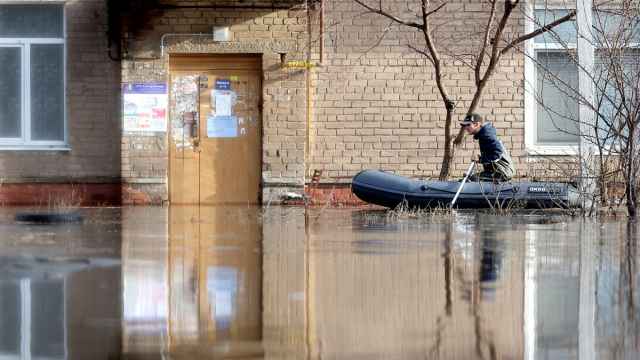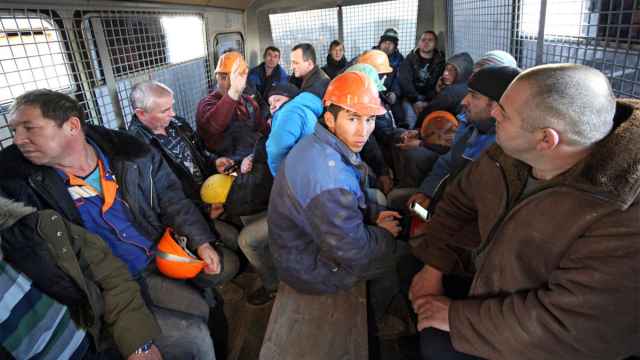Дубак: freezing cold
By Moscow standards, this winter has been quite mild. No weeks or even days below –25 C, no frigid nights when the winds were artic and the windchill plummeted, and not many complaints about apartment house heating systems that couldn’t keep up. Коммунальщики (utility companies) and the city government must be dancing all the way to the bank.
But… early days, folks, early days. We might slide up into spring. Or we might be plunged back into deep winter. Just in case, here’s a little primer on cold — how to express it and how to understand it when your Russian friends and family describe it. You got to know: does Ой дубак! require the light jacket or the Arctic Traveler parka guaranteed to keep you toasty down to –40 C?
Прохладно (cool, chilly). This description depends more on the personality and style of your interlocutor than the weather. If your Significant Other is a master of understatement, Сегодня прохладно can mean anything from “today is the first chilly day of fall” to “today is the first day you need to wear your thermals.” Beware of the diminutive form. Прохладненько! (It’s a bit nippy out there!) is usually a synonym for Отморозил задницу (I froze my butt off.)
Холод (cold) and холодно (it’s cold). This is baseline cold — bearable if you’re properly dressed. However, there is a list of adjectives that you can tack on to clarify and intensify: Адский (hellish); могильный (as cold as the grave); невыносимый (unbearable); жгучий (biting); лютый (bitter); арктический (arctic). There is also собачий (literally “canine”) and зверский (literally “bestial”) cold. No one is quite sure, but it seems that dog and beast cold refers to weather so cold that even the dogs and farm animals can’t stand it and must be brought inside. This can also be expressed as: В такую погоду хороший хозяин и собаку на улицу не выгонит (In this weather a good owner wouldn’t put his dog out.)
Стужа (freezing cold). This word is definitely dated, but it’s worth knowing in case you are talking to a well-educated older person. Besides, it is easy to remember since you know what простужаться is (to catch a cold) and, of course, you know what студень aka холодец is: meat in aspic, which is really just boiled meat in broth that is chilled to set. "Chill" is the key word here. But your cultured neighbor in her 80s will look over your poor outdoor dressing skills and scold: В такую стужу нельзя выходить в лёгкой куртке! (You can't wear a light coat in such freezing weather!)
Мороз (freezing cold temperature); морозно (it’s freezing cold); морозилка (freezer, literally where you keep your ice cream and figuratively what it’s like outside when it’s -25 C); морозить (to freeze, as in “your butt,” see above). Мороз should never be translated as ‘frost’ and морозно is not “frosty.” Snowmen in kiddie songs are frosty. Морозно is not for wimps. It's bone-chilling cold. It generally means “below freezing.” Cемья заключённого провела весь день на улице, с утра до вечера, несмотря на то, что на улице мороз за сорок (The prisoner’s family spent the whole day on the street, from morning until night, even though it was more than 40 C below outside.)
Колотун (shivers). Колотун is from the verb колотить (to shake, to shiver, to hit, as in top teeth hitting bottom teeth). Here we get to describe the weather by its effect on us. But to start with, it can describe what happens when you’re really nervous: Саша трясся, его бил нервный колотун (Sasha was shaking from nervousness, literally “he was hit by nervous shaking”). But you can be hit by the shivers when it’s freezing cold: Проснулся в сарайке, колотун бьёт (I woke up in the shed and started shivering from the cold.) Or the shivers are the weather: Колотун стоял жуткий (The weather was glacial.) You can also say that your teeth chatter: зубы колотит от холода (My teeth are chattering from the cold). Note here колотит is in the impersonal third person: его колотит means “he’s shivering” but it’s as if some unseen force is shaking him — the unseen cold air, I presume.
Дубак, дубняк, дубарь (frozen stiff). These words are all derived from the verb дубеть (to become stiff), which is from the noun дуб (oak, i.e., a hard wood). У них такой дубак! (It’s friggin’ cold where they are!) Here you have to pay attention. If a cultured person or agronomist says дубняк, they may mean an oak grove, but if дубняк is said by a young person, prefaced by an expletive like блин (crap!) or even ой (whoa!), while jumping up and down and rubbing hands together, then you can be sure it means: I’m turning into a human popsicle.
That should take through mid-March. Then we’ll start reviewing words for оттепель (thaw).
Michele A. Berdy is the Arts Editor and author of “The Russian Word’s Worth,” a collection of her columns. Follow her on Twitter @MicheleBerdy.






